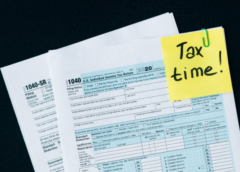Tax administration is a significant headache for the self-employed. It can be confusing, frustrating, and complicated. It’s also one of the biggest hurdles for your business, whether a consultant or an independent contractor.
Many people are reluctant to take the first step because they fear the complicated tax administration systems required to avoid problems with Internal Revenue Service. However, you may have to face new problems with the late penalty if you do not deal with this tax management issue sooner.
 Here are some tips to make it easier to set up your business as a freelancer while managing your tax payment. This way, you can avoid late tax payments. Also, it’s much easier to have a system in place and enjoy all the benefits of self-employment.
Here are some tips to make it easier to set up your business as a freelancer while managing your tax payment. This way, you can avoid late tax payments. Also, it’s much easier to have a system in place and enjoy all the benefits of self-employment.
Keep Good Records
Keeping good records is necessary both for your tax advisor and for yourself in case of an audit. Make your accountant’s job easier by organizing and keeping all of your records in one place. Also, managing it in one place will be beneficial when you have to find an invoice or determine your work for a client.
Take Allowable Deductions
 Don’t forget to claim child care or home office deductions, if applicable. If your home office is used exclusively, solely, and frequently for your business, you can deduct it. You can calculate the square footage of your office and deduct this percentage from your mortgage payment. You can also use this figure to subtract the exact rates from your other bills, such as phone, internet, and electricity.
Don’t forget to claim child care or home office deductions, if applicable. If your home office is used exclusively, solely, and frequently for your business, you can deduct it. You can calculate the square footage of your office and deduct this percentage from your mortgage payment. You can also use this figure to subtract the exact rates from your other bills, such as phone, internet, and electricity.
Set Aside Estimated Tax Payments
As a self-employed business owner, you are not responsible for withholding taxes from your paychecks. Avoid IRS penalties or late fees by carefully planning your quarterly tax payments. This way, you can manage your tax payments well as a self-employed
Never Neglect Saving for Retirement
It’s easy to forget that payroll service doesn’t automatically deduct taxes from your paycheck. You may want to set up a SEP or Keogh plan for retirement. You may also stop receiving employer contributions if you stop working for your employer. You may then want to contribute a little more to make up the difference.
Deduct Business Expenses
 Keep a record of everything you do for the business so you can remove these expenses on Schedule C of your tax return. Have you recently sent direct mail? Have you purchased office supplies, new paper, envelopes, or special software? All you need is a receipt and an explanation of how you use those items. Keep your receipts and store them in a safe place. These little things can make a big difference when it comes to taxation.
Keep a record of everything you do for the business so you can remove these expenses on Schedule C of your tax return. Have you recently sent direct mail? Have you purchased office supplies, new paper, envelopes, or special software? All you need is a receipt and an explanation of how you use those items. Keep your receipts and store them in a safe place. These little things can make a big difference when it comes to taxation.
Get Organized
As mentioned earlier, an organization is vital when it comes to tax management. It can be a big challenge for many people. Although it is not directly related to tax administration, it will help you in all other business areas. You can experiment with different software programs or set up a folder system. Don’t forget to back up your computer regularly if you use it to store your files and records. No matter how advanced your laptop is, it can crash in an instant. This issue has happened too many times to freelancers. Thus, back up and organize them well.
Make the Most of Your Resources
Many organizations can help freelancers run their businesses more efficiently. MBO Partners is a great organization that simplifies tax administration. MBO Partners acts as a registered employer but still gives you all the freedom and benefits of running your own business. Don’t be afraid to use the resources available to make your business run smoother, faster, and more manageable.
